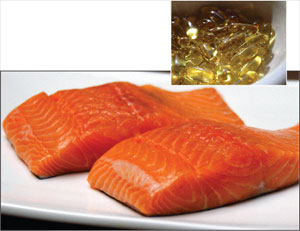Prostate Cancer and Omega-3 Fatty Acids

Critics asserted that the study was observational and did not prove that omega-3 fatty acids caused prostate cancer. Other risk factors could have affected the results, including a family history of prostate cancer, smoking, alcohol consumption and obesity. The researchers used data from the SELECT trial, a large trial designed to examine the link between vitamin E and selenium and prostate cancer. The data did not include information on diet or use of nutritional supplements. Therefore, the researchers could not consider omega-3 fatty acids levels over a longer time period. Blood levels of omega-3 fatty acids can fluctuate daily, and the blood test used in the study evaluated omega-3 blood levels only at a specific point in time.
Other studies have conflicting results regarding the association between omega-3 fatty acids and prostate cancer. For example, a recent Swedish study found that high fish consumption in early and midlife was not associated with overall or advanced prostate cancer risk. The same study found that men consuming fish oil later in life had a lower risk of advanced prostate cancer.2
Many critics of the Brasky study said that the association between prostate cancer and omega-3 fatty acids warrants further examination. Some critics suggested that it may be premature to conclude that men should change their dietary or supplemental habits based on this study alone.
1 Brasky T. et al. Plasma Phospholipid Fatty Acids and Prostate Cancer Risk in the SELECT Trial. J Natl Cancer Inst. 2013; 105(15):1132-1141.
2 Torfadottir J. et al. Consumption of Fish Products across the Lifespan and Prostate Cancer Risk. PLoS One. 2013; 8(4):e59799.







